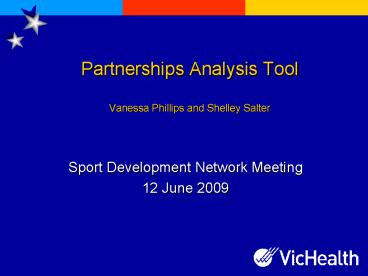Partnerships Analysis Tool Vanessa Phillips and Shelley Salter PowerPoint PPT Presentation
1 / 16
Title: Partnerships Analysis Tool Vanessa Phillips and Shelley Salter
1
Partnerships Analysis ToolVanessa Phillips and
Shelley Salter
- Sport Development Network Meeting
- 12 June 2009
2
Evaluations indicate
- Notion of partnerships is strongly supported but
taken for granted - Focus should be on partnerships which lead to
activity as opposed to partnerships per se - Partnerships increase the resources to a project
- Greater emphasis should placed on partnership
development during the proposal development stage
- Partnerships must be managed (Tower 2001)
3
Challenges to Partnerships
- Diversity of views
- Competing priorities diverse funding models
- Engagement is not easy
4
A Partnerships Analysis Tool
Aim is to help lead agencies reflect on the
partnerships they will develop for a future
project to evaluate the effectiveness of
existing partnerships Activity 1 explores the
purpose of the partnership Activity 2 involves
designing a map which visually represents the
reason for relationship between agencies in the
proposed partnership Activity 3provides a
checklist which defines the key features of a
successful partnership
5
Activity 1
Explores the reason for the partnership Why is
the partnership necessary in this particular
project? What value will the partnership add to
the project? (Five written answers to each
question Compare individual lists Look for
consensus but also be aware of disparities)
6
Activity 3 A Partnerships check-list
- The check-list is designed to provide feedback on
the current state of the partnership and to
suggest areas for development - It is a series of questions grouped under the
headings of - Determining the need for a partnership
- Choosing partners
- Making sure partnerships work
- Planning collaborative action
- Implementing collaborative action
- Minimising the barriers to partnerships
- Reflecting on continuing the partnership
- (to be ranked)
7
A Partnerships check-list continued
- This check-list acts as a summary of complex
actions interactions between a variety of
stakeholders - Deals with the partnership as whole
- Scores are then aggregated to provide a good
starting point for discussions about the
partnership - 0-49 the whole idea of a partnership should be
rigorously questioned - 50-91 the partnership is moving in the right
direction but will need attention to be really
successful - 92-140 A partnership based on genuine
collaboration has been established. The
challenge is to maintain its impetus build on
the current success
8
Activity 2 A continuum of partnerships
- Partnerships should be viewed as existing on a
continuum - The level of partnership can change over time
- Distinctions can be made between
- Networking
- Coordinating
- Cooperating
- Collaborating
9
Mapping Exercise
- Activity 2 involves designing a map which
visually represents the nature of the
relationships between agencies in the
partnership. - It asks you to consider the continuum in relation
to each of your partners.
10
Networking
- Networking
- involves exchange of information for mutual
benefit. - eg. Disability sport agency an SSA
representative meets monthly to provide update on
their programs with people with a disability
11
Coordinating
- Coordinating
- Involves exchange of information altering
activities for a common purpose. - eg. Disability sport agency and SSA
representative work together to schedule program
activities to ensure they are not duplicating
programs for PWD in a region
12
Cooperating
- Cooperating
- Involves exchange of information, altering
activities and sharing resources. - Requires significant amount of time, high level
of trust sharing the turf. - eg. An SSA may pool some resources with a
disability sport agency to run a joint program to
increase participation of PWD in the area (funds,
resources shared)
13
Collaborating
- Collaborating
- In addition to the other activities described,
collaboration includes enhancing the capacity of
the other partner for mutual benefit and common
purpose. - Requires the partner to give up part of their
turf to another agency to create a better or more
seamless service system. - eg. Disability Sport Agency collaborates with a
SSA to build opportunities for participation for
PWD at all levels of the sport (club,
association, SSA)
14
Activity
- On your table identify one project to MAP (that
has partners) - Tell the story of the project so far focusing on
partners - As a group ask questions and flesh out what level
of partnership is in place at this point - Draw the map of the project partnerships (use the
tool as a guide)
15
The Case Study Describe the project through the
relationship between partnering agencies
LOCAL
STATE
The Lead Agency
REGIONAL
16
What Next
- Think about using the tool to review your
existing project partnerships (introduce the tool
to your partners) - At the start of a new project think about using
the tool to establish the purpose of each
partnership before you commence your project - For additional copies of the VicHealth
Partnership Tool contact VicHealth or go to
website www.vichealth.vic.gov.au

